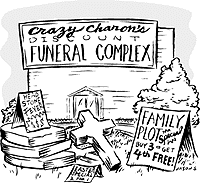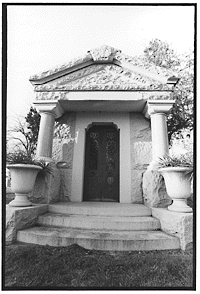https://www.austinchronicle.com/news/1997-03-28/527698/
Death Be Not Cheap
Austin's Largest Death Care Provider May Not Provide Best Deal
By Robert Bryce, March 28, 1997, News

|
In promotional materials, cemeteries are portrayed as peaceful oases where the grass is always neatly cropped. Likewise, funeral homes are made to appear serenely prosperous.
Don't buy it. The funeral industry has become an increasingly cut-throat business where profits, not service, are the barometer of success. And while most funeral homes are still family-owned, big consolidators are snapping up independent funeral homes by the dozen. As the big companies increase their market share, independent owners are being pressured to sell out to the consolidators.
The biggest funeral provider in Austin is Cook-Walden; it dominates the "death care" business in the Austin area, and it's getting bigger. Cook-Walden has begun construction on what will be its sixth funeral home in the region. The new $2.1 million facility will be located in Pflugerville between two of the company's cemeteries, giving customers the option of one-stop shopping.
But very few of Cook-Walden's customers realize that their "local" funeral home is actually just one small part of the world's largest funeral conglomerate, Houston-based Service Corporation International (SCI). Last year, SCI's Austin subsidiary did 40% of the funerals performed in this city, according to one local funeral home that tracks the industry by counting the deaths reported in the local daily. Cook-Walden also operates the Condra Funeral Home in Round Rock and the Davis Funeral Home in Georgetown.
Cook-Walden is leading the local market even though, like many other SCI funeral homes, its prices are often substantially higher than those of locally owned funeral homes. But that's Cook-Walden's advantage: Few people shop around when using funeral services. For one thing, there's very little time to bargain-hunt; if you are a traditionalist, the body needs to be refrigerated or embalmed, services have to be set, a member of the clergy has to be contacted, relatives informed, an announcement in the newspaper placed, clothes found, food cooked, a "party" arranged -- the list goes on and on. And aren't funeral directors good at making customers feel that haggling is just a little gauche at a time like this? The effect of all this pressure is that many people skip doing any homework and take the first deal that is offered. No doubt aware of this phenomenon, SCI spends a lot of money advertising the Cook-Walden logo, and it's the most recognized name in the Austin market.
Now operating 2,800 funeral homes, 250 cemeteries, and 137 crematoria, SCI had revenues last year of $2.29 billion, and it handles about one of every 10 funeral services in the U.S. -- some 230,000 funerals per year. The company has buried some of America's most famous personalities, including John Lennon, Howard Hughes, and Jacqueline Kennedy Onassis.
SCI has advantages that other businesses would die for: Its profit margin in 1995 was 11%, nearly twice the average of American companies as a whole; it is recession-proof; profit margins can be as high as 80%; everyone needs the service; logistics and the high price of entering the market keep foreign competitors at bay; customers rarely compare prices; and best of all, many customers pay in advance.

Mausoleums, like this one in central Austin, are too expensive for most families |
Over the past four decades, Waltrip has parlayed a single funeral home on Houston's Heights Boulevard into the McDonald's of the funeral business. SCI dominates the death-care market in the same way McDonald's dominates the fast food industry. But unlike McDonald's, which must contend with vegetarians and health food devotees who don't want their product, everyone is a potential customer for SCI. And while the allure of McDonald's is the relatively cheap fare, Waltrip's customers think nothing of plunking down huge chunks of their savings. And just as Ray Kroc brought mass-production techniques to the hamburger business, Waltrip realized that the funeral business consists of a series of steps that can easily be simplified and made more profitable.
"Things about this business are the same as in McDonald's," Waltrip explained during an interview last year in his office atop SCI's headquarters on Houston's Allen Parkway. Both businesses have a set of fixed costs. By buying in quantity and warehousing commodities -- like coffins and embalming fluid -- needed by the various outlets, SCI reduces its costs and increases its profits. Once the company covers its fixed costs at a given location, up to 80% of additional revenues go straight to the bottom line. "What we are able to do is very simple," says Waltrip. "And it didn't take a genius to figure it out."
So Waltrip began the consolidation of a moribund industry that, until he launched SCI, consisted almost entirely of family-owned funeral homes. Today, SCI has a spate of imitators, including New Orleans-based Stewart Enterprises and Vancouver-based Loewen Group. But SCI is more than three times as big as than Loewen and 10 times larger than Stewart.
In Austin and elsewhere, SCI cuts costs by allowing several mortuaries to share the same fleet of hearses and limousines. The company also tries to centralize its embalming, warehousing, and accounting operations. This practice, which SCI calls "clustering," reduces overhead and saves on labor costs.
The new funeral home in Pflugerville showcases another element in SCI's strategic plan. The new facility, which will be called Cook-Walden Capital Parks, will be flanked by two of the biggest cemeteries in the region: Cook-Walden Capital Parks and Cook-Walden Memorial Hill. Putting the funeral home at the cemetery reduces SCI's overhead, and it gives their sales force an advantage when selling cemetery plots and crypts.
SCI already has dozens of funeral home/cemeteries, facilities that SCI's insiders call "combos." And while the combos reduce the company's costs, SCI rarely passes those savings on to customers. In fact, SCI's funeral prices in the Houston area have been cited as some of the most expensive in the nation by Karen Leonard, a representative for the Funeral and Memorial Society, a national, non-profit consumer organization. Leonard estimates that SCI controls 70% of Houston's funeral business. And a survey of Houston mortuaries completed last August by the Arizona-based Interfaith Funeral Information Committee found that nine of the 10 most expensive funeral homes in the city were operated by SCI.
SCI's prices in Austin are generally lower than what the company charges its clients in Houston. For instance, the basic services, or cover charge, that SCI charged last year at its Pat H. Foley funeral home in Houston was $1,550. Cook-Walden charges $1,125.
Still, a comparison of price lists shows that SCI's prices are generally higher than those of locally owned funeral homes (see chart). For instance, whether you choose burial or cremation, Cook-Walden is the second most expensive provider among the five funeral homes we surveyed. For a direct cremation, with no ceremonies or viewing, their price of $1,365 is on the high end of a scale ranging from $775 to $1,660. And for the combination of basic services and embalming, where prices range between $1,000 and $1,475, Cook Walden comes in at $1,420. (Note that none of these prices include a container -- casket or urn -- or other optional services you may require.) On the other hand, a couple of the other businesses are higher on specific services, and casket prices at some local funeral homes are also higher than those at Cook-Walden.
John Amey, who began working in the Austin funeral business in 1955 and now owns two mortuaries in Austin -- Wilke-Amey-Clay and Amey Funeral Home -- says he gets many customers from Cook-Walden who are irritated over the company's pricing. He calls SCI's prices "highway robbery," adding that whenever SCI buys a funeral home, "The first thing they do is cut expenses and raise prices."
Houstonian Barbara Baker does not have fond memories of dealing with SCI. On June 2, 1995, she pre-paid SCI's Forest Park-Lawndale funeral home for a cemetery plot and funeral for her ailing mother. A month later, her mother died. But, she says, SCI officials refused to honor her contract even though Baker showed them her receipts. And she says Forest Park-Lawndale officials refused to proceed until she signed a new contract. "Their excuse was they don't keep copies of pre-paid funerals," recalls Baker, who added that company salespeople tried to sell her flowers, cards, monuments and other items. When she refused to buy any of them, she says, salespeople became rude. She adds that the company also forgot to run an obituary for her mother in the paper. Baker later wrote letters of complaint to every member of SCI's board of directors. She says that none of them ever responded.
"The only restitution we got was they sent me a check for $100," says Baker. "I sent it back and said my mother's life is worth more than $100."
Ironically, Baker says that she continues to be harassed by SCI salespeople trying to sell cemetery plots. "They call me constantly," said Baker. She said her husband recently threatened legal action against the company to get the calls stopped. Baker says of SCI, "Their interest is only in money and in making it as fast as they can and they do not offer any services to make anybody feel any better."
SCI officials in Houston and Austin were contacted by the Chronicle and asked to comment for this story. They did not respond.
Copyright © 2024 Austin Chronicle Corporation. All rights reserved.
